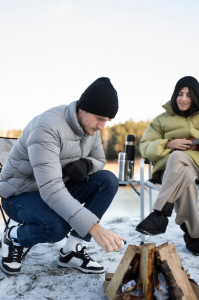News Center+ 查看更多
The Essential Guide to Camping for Beginners: Ensuring a Memorable Outdoor Experience+ 查看更多
The basics begin with shelter; a sturdy tent tailored to expected weather conditions and the number of occupants is crucial. Accompanied by a season-appropriate sleeping bag and a comfortable sleeping pad or air mattress, the foundation for restful nights in the wild is set. Lighting is another essential, with a headlamp or flashlight providing the necessary illumination once the sun dips below the horizon. A multipurpose tool is indispensable, serving a variety of functions from food preparation to minor tent repairs. Additionally, reliable fire-starting methods such as lighters, matches, or firesteel are a must for warmth and cooking.
Culinary Necessities and Nourishment in the Wilderness
When it comes to sustenance, the allure of campfire-cooked meals adds to the overall experience. A portable stove, sufficient fuel, and lightweight cookware are key for crafting simple yet satisfying dishes. Planning meals ahead and packing the appropriate food ingredients ensures that energy levels remain high for the duration of the trip. Biodegradable soap, dishcloths, and trash bags are also necessary for maintaining cleanliness and adhering to eco-friendly practices in natural settings.
Personal items should not be overlooked, as varying weather patterns demand appropriate attire, including rain gear and warm clothing. Personal hygiene products, though often minimal in a camping setting, are essential for comfort and health. Sun protection in the form of sunglasses, hats, and sunscreen shields campers from the harsh rays, while a well-stocked first aid kit prepares them for minor injuries and ailments.
Navigating Nature: Tools and Techniques
In terms of navigation, the traditional compass and map duo remain relevant, especially in areas devoid of cellular signals where modern GPS devices may fail. Understanding the topography and orienting oneself can make the difference between a serene camping experience and a distressing ordeal. This fundamental knowledge of navigation further instills a sense of confidence and independence in novice campers.
For those unsure of which gear to select, practical advice includes choosing a freestanding tent for ease of setup, a synthetic-filled sleeping bag for moisture resistance, and a simple portable stove for cooking. Integrated cookware sets are also suggested for their compact storage and portability. The proper gear not only simplifies the process but also elevates the comfort of the camping adventure.
Finding the Perfect Campsite
Researching camping areas with a reputation for being beginner-friendly is the first step toward a successful excursion. Utilizing online resources, forums, and official park websites can yield valuable insights into potential sites. Opting for a campsite with amenities like toilets, showers, and water sources can provide a level of convenience that eases the transition for new campers.
Site selection should prioritize flat terrain with good drainage, avoiding proximity to rivers and low-lying areas to mitigate flood risks. Safety is paramount; ensuring the absence of wildlife hazards and adherence to all camping regulations is non-negotiable. If specific outdoor activities are planned, proximity to those points of interest should influence the choice of campsite.
Keeping abreast of the weather forecast and any conditions that may impact the camping plans is vital. Adhering to the "Leave No Trace" principle is a responsibility every camper holds; preserving the environment and respecting wildlife ensures both personal enjoyment and the enjoyment of others in this shared natural space.

